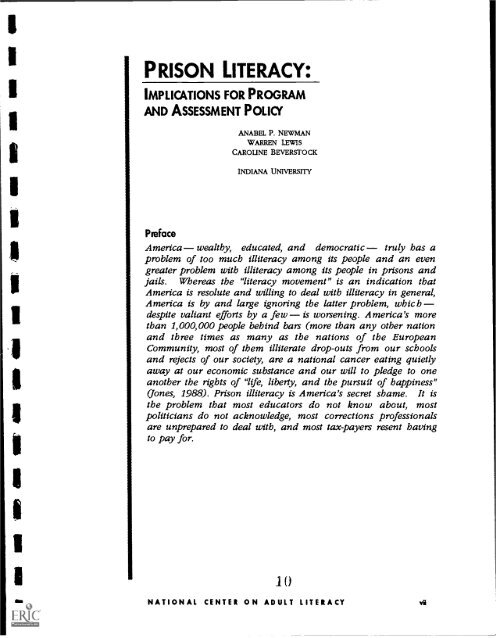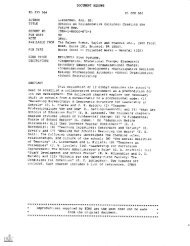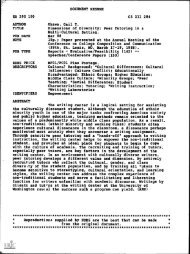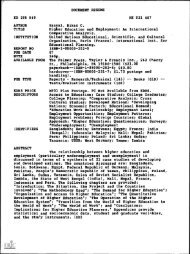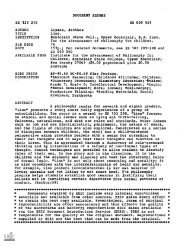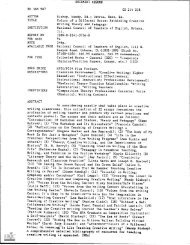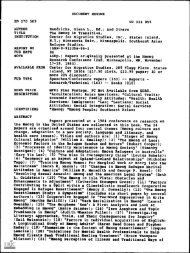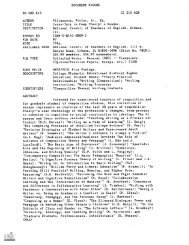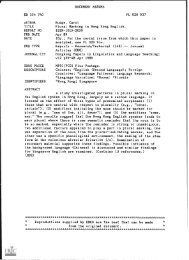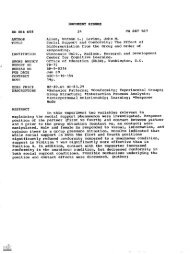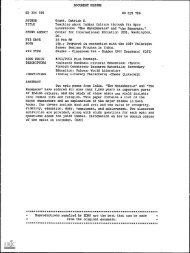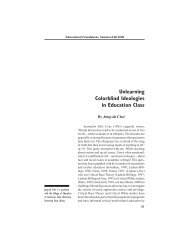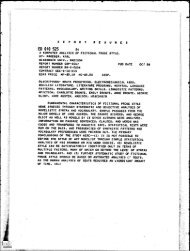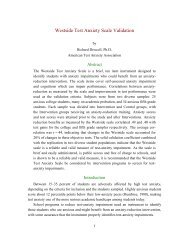- Page 1 and 2: DOCUMENT RESUMEED 363 729AUTHORTITL
- Page 3 and 4: PRISON LITERACY:IMPUCATIONS FOR PRO
- Page 5 and 6: ACKNOWLEDGMEN TSOne of the hidden b
- Page 7 and 8: project, his major effort at workin
- Page 9: H. Implications for a Model Literac
- Page 13 and 14: The results of study, and the revie
- Page 15 and 16: A. STATEMENT OF THE PROBLEM:PUTTIN
- Page 17 and 18: vocational training, and prison ind
- Page 19 and 20: driver-instruction manual, grasp jo
- Page 21 and 22: C. WHO ARE THE INCARCERATEDNEEDING
- Page 23 and 24: habilitation is the purpose of inca
- Page 25 and 26: Americans find themselves as inmate
- Page 27 and 28: 72% of the prisons surveyed offered
- Page 29 and 30: A most insightful study of "learnin
- Page 31 and 32: numbers of inmates enrolled in thes
- Page 33 and 34: D. THE BACKGROUND OFPRISON LITERACY
- Page 35 and 36: vocational education towards post-r
- Page 37 and 38: Two years later, Brockway attended
- Page 39 and 40: By the 1960s, unevenness in prison
- Page 41 and 42: that "a prisoner is not stripped of
- Page 43 and 44: E. ILLITERACY AND CRIMINALITY:LITER
- Page 45 and 46: indicated a range of abilities that
- Page 47 and 48: Others similarly have uttered cavea
- Page 49 and 50: Characteristics of Effective Litera
- Page 51 and 52: F. THE PARADIGMS OF PRISONEDUCATION
- Page 53 and 54: unreformed attitude among the priso
- Page 55 and 56: may be resolved, this human factor
- Page 57 and 58: educators, but, surely, the best th
- Page 59 and 60: 6. THE COGNITIVE ELEMENTMoral reaso
- Page 61 and 62:
In her most recent restatement of t
- Page 63 and 64:
Thus whether one opts for student c
- Page 65 and 66:
on literacy education, teaching met
- Page 67 and 68:
libraries, though inmates were perm
- Page 69 and 70:
new jail is under construction tbat
- Page 71 and 72:
1. A LITERACY PROGRAM EDUCATES BROA
- Page 73 and 74:
vocational education within a workp
- Page 75 and 76:
Another reason to remove education
- Page 77 and 78:
not to self-efficacy, i.e., adaptiv
- Page 79 and 80:
4. A UTERACY PROGRAM IS COST-EFFEME
- Page 81 and 82:
corrections costs, increase offende
- Page 83 and 84:
until one is satisfied with the pro
- Page 85 and 86:
as a legal resource, use of bibliot
- Page 87 and 88:
counselors and teachers, but not if
- Page 89 and 90:
skills. Besides computers, interact
- Page 91 and 92:
offer the promise of increased atte
- Page 93 and 94:
I. ASSESSMENT OF LEARNERS ANDEVALUA
- Page 95 and 96:
inconsistency, and unreliability, e
- Page 97 and 98:
expect attrition in the population
- Page 99 and 100:
ability, tests of learning potentia
- Page 101 and 102:
of prison-related authorities with
- Page 103 and 104:
Program evaluation and learner asse
- Page 105 and 106:
APPENDIX A: CHECKLIST OF QUESTIONSF
- Page 107 and 108:
PARADIGMS (EXAMPLES OR MODELS) OF P
- Page 109 and 110:
PROGRAMS (CONTINUED)No. Question Y.
- Page 111 and 112:
IIIII1IIIIII1IIIIIIPROGRAMS (CONTIN
- Page 113 and 114:
IIIIIII1IIIIIIIIIII-PROGRAMS (CONTI
- Page 115 and 116:
IIIIIIIIIIIIIII1IIIPROGRAMS (CONTIN
- Page 117 and 118:
1EDUCATIONAL STMF (CONTINUED)No. Qu
- Page 119 and 120:
GOVERNANCENo. Owes lion Y. s No. Do
- Page 121 and 122:
COMMUNICATIONS (CONTINUED)No. Quest
- Page 123 and 124:
LIBRARIES (CONTINUED)No. Question Y
- Page 125 and 126:
I1IIIIIIIIIIIITECHNOLOGY (CONTINUED
- Page 127 and 128:
ASSESSMENT AND EVALUATION (CONTINUE
- Page 129 and 130:
ASSESSMENT AND EVALUATION (CONTINUE
- Page 131 and 132:
IiiIJAILS (CONTINUED)No. Ouostion Y
- Page 133 and 134:
IIIPoucy (CONTINUED)No. Question Y.
- Page 135 and 136:
POUCY (CONTINUED)No. Ouestion Yes N
- Page 137 and 138:
POLICY (CONTINUED)No. Question Yes
- Page 139 and 140:
APPENDIX B: AREAS IN NEED OFFURTHER
- Page 141 and 142:
11. Determination of whether the ed
- Page 143 and 144:
11 Holt V. Sarver (II) [309 F.Supp.
- Page 145 and 146:
female, and their numbers have decl
- Page 147 and 148:
community (Ryan, 1989); the Folloup
- Page 149 and 150:
excellent auto mechanics and cosmet
- Page 151 and 152:
48 Hamm, 1988, p. 147; Oh lin, 1986
- Page 153 and 154:
and Correctional Education Associat
- Page 155 and 156:
citizens enjoyed, lending to each s
- Page 157 and 158:
BIBLIOGRAPHYNote: Some of the items
- Page 159 and 160:
Atteberry, J. W., & Tacker, A. B. (
- Page 161 and 162:
the Rio de Janeiro penitentiary sys
- Page 163 and 164:
Breed, A. (1981). Charge. Proceedin
- Page 165 and 166:
(1983). Cataloo of Adult Education
- Page 167 and 168:
Conrad, J. P. (1965). Crime and its
- Page 169 and 170:
Decker, J. M. (1980). Inside prison
- Page 171 and 172:
Dwyer, P., & Botein, M. (1974). The
- Page 173 and 174:
Farrar, J. R. (1986). Achieving pri
- Page 175 and 176:
Gehring, T. (1989, December). A cha
- Page 177 and 178:
Greenwood, P. W. (1988). Correction
- Page 179 and 180:
Helgeson, M. E., & Hisama, T. (1982
- Page 181 and 182:
177). Ithaca NY: Cornell University
- Page 183 and 184:
Ketterling, M. E. (1970). Rehabilit
- Page 185 and 186:
Lee, R., & Haynes, N. (1980). Proje
- Page 187 and 188:
Lucas, G. S. (1985). Volunteer comm
- Page 189 and 190:
McCollum, S. (1978, Special Issue).
- Page 191 and 192:
Mil lot, K. (1982). Higher educatio
- Page 193 and 194:
Nordwall, A. (1974). Need for educa
- Page 195 and 196:
Pendleton, E. P. (1988, June). Stud
- Page 197 and 198:
(1978). Prisoner education. A selec
- Page 199 and 200:
Reynolds, J. (1982). Incarcerated s
- Page 201 and 202:
Rutherford, R. B., Jr. (1988, Summe
- Page 203 and 204:
Seashore, M. J., Haberfeld, S., Irw
- Page 205 and 206:
Stevens, R. D. (1986, October). The
- Page 207 and 208:
Traynelis-Yurek, E., & Giacobbe, G.
- Page 209 and 210:
Institute of Justice, National Crim
- Page 211 and 212:
Wolford, B. (1983a). Correctional e


